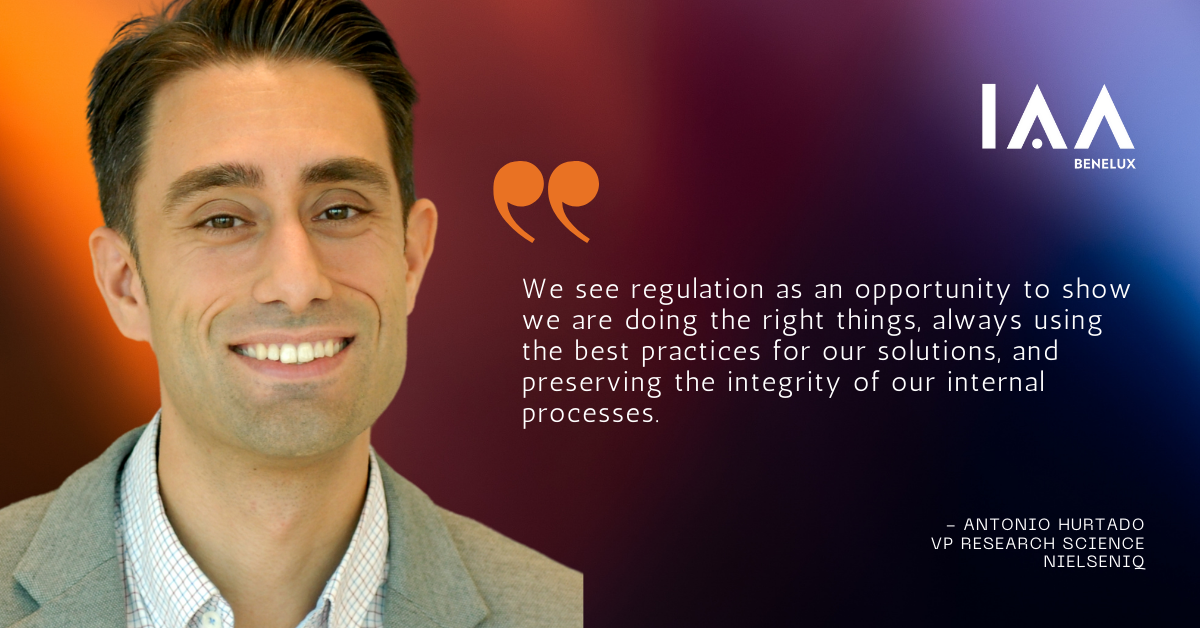In this interview, we sit down with Antonio Hurtado, Vice President of Research Science at Nielsen IQ, whose career spans over 15 years in AI, software development, and data science. Hurtado has managed large-scale AI and data science programs, focusing on cutting-edge machine learning and computer vision, with notable achievements including numerous published papers and nine patents.
Join IAA Benelux as we delve into Hurtado’s insights on the evolving landscape of consumer intelligence, technological innovation, and AI.
IAA Benelux: Has the recent evolution of AI changed anything within your organization?
Hurtado: Generative AI has disrupted almost every industry in the world. NIQ has been utilizing AI for more than 20 years, investing in the same technology used in Generative AI models, which has helped NIQ rapidly adapt to the latest models.
Companies, including ours, need to pivot to an AI-centric approach rather than seeing it as just another step in product development.
Generative AI is not a trend but a product development component. This helped to create some of these opportunities faster than before and provide a human-level interaction grade for our tools. Our developers are primarily using AI tools to ensure quality code is being created, and we also have our internal version of GPT, called Ask Arthur, that helps our commercial teams and others to address repetitive tasks with a high grade of accuracy.
IAA Benelux: What do you see as the risks of AI for your organization and for the industry as a whole? What is your organization’s role in mitigating those risks?
Hurtado: When it comes to AI, some areas can be seen as risks for the industry, such as misuse of AI in areas where the solution is not fit or perceiving AI as a threat to the organization, where the human factor is no longer that important.
In addition to these common areas, Generative AI brings inherently new risks like trust or transparency. Given the human-grade responses these systems can provide, building trust around the solutions is essential for implementing these solutions in production. The other factor, transparency, linked to the previous point, is significant for understanding the system’s decisions. Generating guardrails around AI systems is essential for predicting how the system will behave.
That is why it is essential to create awareness of the solution and its limitations. AI has become another great tool used in the right place and can complement human intelligence to provide the best business insights.
We at NIQ see this opportunity to organize ourselves in cross-functional teams that can provide different perspectives on reducing those risks and creating guardrails and governance processes for any AI process.
IAA Benelux: How do you ensure responsibility over AI-systems used within your organization?
Hurtado: Through governance, the teams are empowered to make the right choice regarding AI systems. We have executive-level sponsorship to ensure there is cross-functional global governance.
It is also crucial for us to invest in training supported by our global learning platforms and partnerships. We have seen that upskilling the entire organization can provide many advantages with the AI system, so everyone is on guard to identify any possible lousy use of our AI solutions. In addition, for any AI solution we deploy in the market, we have a thorough process that evaluates whether there is bias in the solution we are implementing.
Our principles guide us, and they also apply in this space. We communicate frequently our principles and policies on safe and responsible AI development.
IAA Benelux: What do you see as the opportunities for the use of AI?
Hurtado: AI will transform how we interact with the data with the tools. This will help us fully reimagine how we get the inputs, but overall, how we can accelerate speed to insights and depth of understanding. We’ll be able to draw richer and deeper insights, allowing them to focus on making better decisions. We can unlock new product opportunities.
Internally, we use it to increase the quality and reliability of our data, provide better and more reliable processes, and always ensure the quality of our deliveries.
Data will be the new fuel for the industry, but not only in terms of quantity; quality will still be essential. AI cannot differentiate between good and bad data.
IAA Benelux: Do you see the industry using AI for the collective good?
Hurtado: Data is critical nowadays. The more types of inputs we have in the datasets, the more complete the view will be provided. AI is as good as the underlying data, so merging different data types creates further opportunities. We at NIQ have seen this very clearly, which is why we have been merging different inputs since many years ago, helping provide the Full View to any market.
Data ownership will still be crucial, so we are investing in different paths to share data confidentially so that all parties can get the most out of it.
IAA Benelux: How are the regulations around AI, such as the EU AI Act impacting your business in the EU and abroad? Do you see these regulations as opportunities or threats?
Hurtado: We always have in mind regulations in all areas we work, not only in the EU. The US has also been advancing regulation lately, and we need to keep an eye on the evolution of those new processes.
We see regulation as an opportunity to show we are doing the right things, always using the best practices for our solutions, and preserving the integrity of our internal processes. It is needed to avoid the misuse of AI solutions in the industry, which can harm people or other companies.
This is an excellent opportunity to provide transparency in creating these systems and generate trust in the solutions we are applying. We are very confident in our best-in-class set of solutions.

